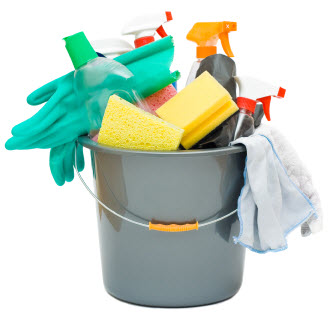Contrary to popular belief, project management isn’t all fun and games. Anyone who’s done their time at the wheel knows that PM’s do their fair share of work that’s not exactly glamorous. In fact, they often have to fight the perception that they’re spinning their wheels while individual contributors get to move happily along creating tangible products.
We know that project managers make major strategic contributions by creating project charters, obtaining support of stakeholders, gathering requirements, coordinating team communications, and managing risks and costs. But layered underneath those activities is a set of “chores” every good project manager has to keep on top of, otherwise their projects start to get very messy. Here are some of the primary ways your project manager keeps a clean house:
1) Creating detailed work breakdown structures.
The WBS is the foundation of every good plan. Project team members must know exactly what tasks need to be done before the work can be assigned, and estimated, and scheduled. People with short attention spans need not apply – this can take hours and requires a thorough, methodical process.
2) Verifying that tasks are estimated correctly at all times.
It’s not just the estimates at the start of the project that matter. Good project managers need to know how estimates and remaining work changes over the life of the project. So whether they take the more arduous path of collecting revised estimates from each team member and updating the plan themselves, or make things easier by having team members make their own updates in the tracking system, this chore can’t be ignored. If it is, the schedule dies and the ability to make informed decisions goes out the window.
3) Ensuring that all team members know what tasks they need to be working on.
Sounds a little like babysitting, doesn’t it? But when you’ve got multiple resources, dependencies, and concurrent projects, assignments needs to be clearly defined and prioritized. A good tool will support this process, but the PM must verify that the connections are being made and no one is sitting idle while a critical task is laying in wait. It’s resource management 101.
4) Plan clean-up and organization.
In any shared system like LiquidPlanner, regular clean-up passes should be done against the plan to keep tasks, projects, and portfolios organized and current. Is there one person who forgot to update their status last week? Has new work cropped up that needs to be reprioritized? It’s time for janitor duty – weekly plan maintenance keeps team members who log in to update from being annoyed or frustrated.
5) Regular health checks and reporting.
The two go hand in hand. Project sponsors and stakeholders want frequent, thorough, and nicely packaged reports on status, risks, and costs. If the plan is up to date, reporting should be easy, right? Not necessarily. Many times the most important details about a project won’t be spit out automatically by a tool. Rather, the PM needs to distill the relevant information in a custom way, depending on the format requested, the context, and the audience. And in this case, looks count. Sharing a sloppily compiled update won’t cut it. The report may only be reviewed for a few minutes, but it can take much longer than that to create.
This list goes on, but you get the idea. So with all of these chores to take care of every day, why all the interest in the field of project management in the first place? Think of it like farming. The farmer’s job is anything but glamorous most of the time, but at the end of the day, she’s got a bountiful crop to show for it. Same goes for project managers – the time spent managing these details plays directly into how well they can accomplish big-picture business objectives. Those of us who’ve worked with good PMs know this to be a fact.
So a big thanks to all you PMs out there. Our goal at LiquidPlanner is to make your lives easier with a good tool, so you can spend less time on chores and more time enjoying the fruits of your labor.
*It should be acknowledged that pretty much every job has its own chore list. We don’t mean to imply that if you’re not a project manager, you don’t have annoying things to do.







